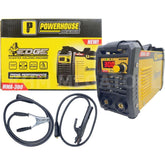Landline
- (02) 84042435
- 79784632
- Globe(Viber)
- 09171755822
- 09171742423
- Smart
- 09228996639
- Email: sales@toolssavvy.ph
Trending Now
Popular Products
Vendor:ARC
ARC Magnetic Starter Enclosure (WYE-Delta Box)
ARC Magnetic Starter Enclosure (WYE-Delta Box) Model Dimensions Gauge HP Price DP W H Y61212 6 12 12 16 7.5 1,700.00 Y61518 6 15 18 16 20 2,600.00 Y71822 7 18 22 16 40 3,700.00 Y71830 7 18 30 14 75 5,500.00 Y82232 8...
- From ₱1,700.00
₱0.00- From ₱1,700.00
- Unit price
- / per
Vendor:Powerhouse
Powerhouse EDGE MMA300 DC Inverter Welding Machine 300A
Powerhouse EDGE MMA300 DC Inverter Welding Machine 300A
Powerhouse Edge Inverter Type Welding Machine MMA-300AMP PHWM
Model: PH-EDGE-MMA300Ampere Output 300ARelated Voltage 220-230VRelated Frequency 50-60HZUsable Electrode 1.0-4.0MDuty Cycle 60%
INCLUSIONS:
1PC - Electrode Holder1PC - Ground Clamp
3 Months Limited Warranty
- ₱2,490.00
₱5,500.00- ₱2,490.00
- Unit price
- / per
Vendor:Arcsmith
ArcSmith MIG Wire (Gas Type)
Size (mm)
0.6
0.8
1
1.2
ER70S-6 (5kg)
-
720.00
-
-
ER70S-6 (15kg)
-
1,680.00
1,620.00
1,560.00
ER70S-6 (250kg)
-
-
-
-
Alum-5356 (6kg)
-
-
3,315.00
-
SS 308L (12.5kg)
-
7,000.00
7,000.00
-
- From ₱720.00
- From ₱720.00
- Unit price
- / per
Found a better price? We PRICE MATCH!
Trending Now
Popular Products
Vendor:ARC
ARC Magnetic Starter Enclosure (WYE-Delta Box)
ARC Magnetic Starter Enclosure (WYE-Delta Box) Model Dimensions Gauge HP Price DP W H Y61212 6 12 12 16 7.5 1,700.00 Y61518 6 15 18 16 20 2,600.00 Y71822 7 18 22 16 40 3,700.00 Y71830 7 18 30 14 75 5,500.00 Y82232 8...
- From ₱1,700.00
₱0.00- From ₱1,700.00
- Unit price
- / per
Vendor:Powerhouse
Powerhouse EDGE MMA300 DC Inverter Welding Machine 300A
Powerhouse EDGE MMA300 DC Inverter Welding Machine 300A
Powerhouse Edge Inverter Type Welding Machine MMA-300AMP PHWM
Model: PH-EDGE-MMA300Ampere Output 300ARelated Voltage 220-230VRelated Frequency 50-60HZUsable Electrode 1.0-4.0MDuty Cycle 60%
INCLUSIONS:
1PC - Electrode Holder1PC - Ground Clamp
3 Months Limited Warranty
- ₱2,490.00
₱5,500.00- ₱2,490.00
- Unit price
- / per
Vendor:Arcsmith
ArcSmith MIG Wire (Gas Type)
Size (mm)
0.6
0.8
1
1.2
ER70S-6 (5kg)
-
720.00
-
-
ER70S-6 (15kg)
-
1,680.00
1,620.00
1,560.00
ER70S-6 (250kg)
-
-
-
-
Alum-5356 (6kg)
-
-
3,315.00
-
SS 308L (12.5kg)
-
7,000.00
7,000.00
-
- From ₱720.00
- From ₱720.00
- Unit price
- / per
00 items
Top Reason You Shouldn't Buy and Avoid Fake Tools
Buying fake tools can seem like a tempting way to save money, but it often comes with significant risks and drawbacks. Here are the top reasons you should avoid purchasing counterfeit
Safety Risks
|
 |
Poor Quality and Durability
|
 |
Lack of Warranty and Support
|
 |
Decreased Efficiency
|
 |
Financial Implications
|
 |
In summary, while fake tools may offer a lower price, the potential risks and long-term costs make them a poor investment. Opting for genuine tools from reputable manufacturers ensures safety, reliability, and overall better value.
Want something else? Try typing keywords here!
If we don't have it here, we will help you find it! Just contact us instead Tool Lover!
- Choosing a selection results in a full page refresh.






